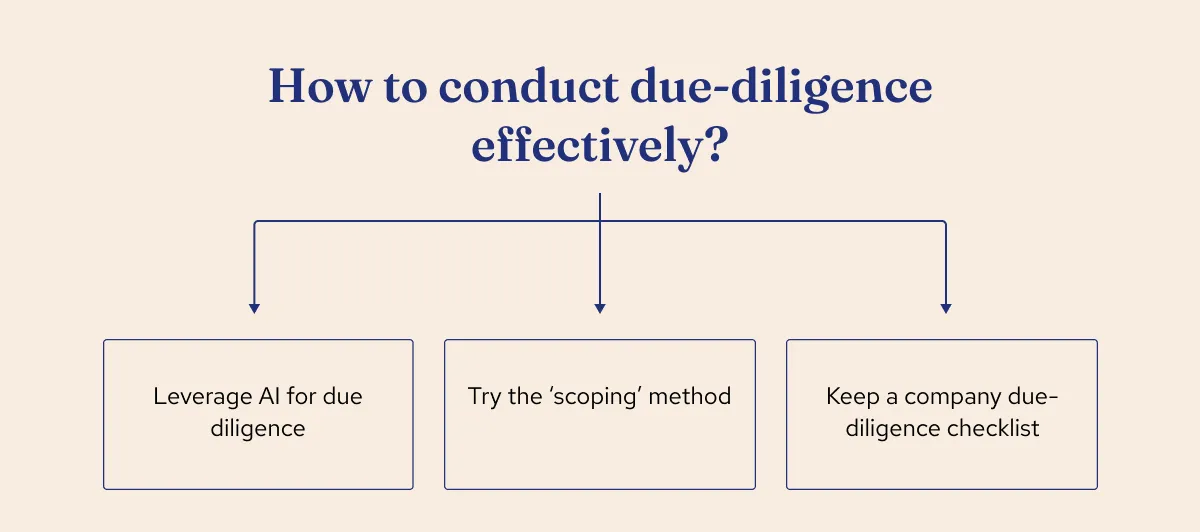How to Conduct Due Diligence on a Company

Strong 8k brings an ultra-HD IPTV experience to your living room and your pocket.
Due diligence is a critical process that investors, acquirers, and partners undertake to thoroughly assess a company before making a significant investment or business decision. It helps identify potential risks and liabilities, evaluate the company’s financial health, and ensure compliance with legal and regulatory standards. Here’s a comprehensive guide on how to conduct due diligence effectively.
1. Define the Purpose of Due Diligence
Before diving into the due diligence process, it’s essential to define its purpose. Are you considering an acquisition, forming a partnership, or investing in the company? Understanding your specific objectives will help tailor the due diligence process to address your concerns and goals.
2. Assemble a Due Diligence Team
Depending on the size and complexity of the company, forming a multidisciplinary team can provide a comprehensive perspective. Include professionals from various fields such as finance, legal, tax, and industry-specific experts. This collaborative approach ensures that all relevant aspects are scrutinized.
3. Gather Preliminary Information
Start with publicly available information to gain a preliminary understanding of the company. This includes:
Company Website: Check the company’s mission, values, product offerings, and leadership team.
Press Releases and News Articles: Look for recent news about the company to identify any potential issues or achievements.
Social Media: Analyze the company’s presence on platforms like LinkedIn, Twitter, and Facebook to gauge customer engagement and brand perception.
4. Financial Due Diligence
Financial health is often the primary focus of due diligence. Key aspects to examine include:
Financial Statements: Review the balance sheet, income statement, and cash flow statement for the past three to five years. Pay attention to revenue trends, profit margins, and debt levels.
Auditor Reports: Assess any audit reports to understand the financial practices and any red flags raised by auditors.
Tax Compliance: Verify that the company is up-to-date with tax obligations and has no outstanding issues with tax authorities.
Forecasts and Projections: Evaluate the company's financial forecasts to understand growth potential and the assumptions behind them.
5. Legal Due Diligence
Legal due diligence involves reviewing a company's compliance with laws and regulations. Key areas to investigate include:
Corporate Structure: Understand the company’s ownership structure, including subsidiaries and joint ventures.
Contracts and Agreements: Review major contracts, including vendor agreements, customer contracts, and employment agreements. Look for any clauses that could impact future operations.
Litigation History: Investigate any ongoing or past litigation that may affect the company's reputation or financial standing.
Intellectual Property: Ensure that the company owns or has rights to its intellectual property and that there are no pending disputes.
6. Operational Due Diligence
Assess the company's operational processes to gauge efficiency and effectiveness. Key considerations include:
Management Team: Evaluate the experience and background of key executives. Strong leadership is often a predictor of a company’s success.
Business Model: Understand how the company generates revenue and identify any potential risks or dependencies.
Operational Metrics: Analyze key performance indicators (KPIs) to measure the company’s operational efficiency, such as customer acquisition costs and churn rates.
Supply Chain and Logistics: Investigate the company’s supply chain reliability and any potential vulnerabilities.
7. Market and Competitive Analysis
A thorough understanding of the market landscape is vital for assessing a company’s potential. Consider the following:
Market Position: Determine the company's position within its industry and its market share.
Competitive Analysis: Identify key competitors and analyze their strengths and weaknesses relative to the target company.
Industry Trends: Research current trends affecting the industry, such as technological advancements, regulatory changes, and shifting consumer preferences.
8. Cultural Fit and Employee Relations
Cultural alignment can be a significant factor in the success of mergers and acquisitions. Investigate:
Company Culture: Review employee feedback through platforms like Glassdoor or Indeed to gauge employee satisfaction and company culture.
Retention Rates: Examine employee turnover rates and assess any underlying issues that may affect morale and productivity.
Workforce Diversity: Evaluate the company’s commitment to diversity and inclusion, which can impact innovation and market reach.
9. Environmental, Social, and Governance (ESG) Considerations
ESG factors are becoming increasingly important in due diligence. Assess the company’s:
Environmental Impact: Investigate the company's sustainability practices and any environmental liabilities.
Social Responsibility: Examine the company’s involvement in the community and its impact on stakeholders.
Governance Practices: Review the company's governance structure, including board composition and ethical standards.
10. Prepare a Due Diligence Report
Once all information has been gathered and analyzed, compile a comprehensive due diligence report. This document should summarize your findings, highlight potential risks, and provide recommendations. The report should be clear, concise, and structured to facilitate decision-making.
11. Engage in Continuous Monitoring
Due diligence doesn’t end once the initial assessment is completed. Continuous monitoring of the company’s performance and any emerging risks is essential, particularly if you decide to proceed with an investment or acquisition. Establish key performance indicators and regular review processes to stay informed.
Conclusion
Conducting due diligence on a company is a meticulous process that requires attention to detail and a comprehensive approach. By assessing financial, legal, operational, and cultural aspects, you can make informed decisions that mitigate risks and maximize opportunities. Whether you are an investor, acquirer, or partner, thorough due diligence is essential to safeguarding your interests and ensuring a successful business relationship.
read more...
Note: IndiBlogHub features both user-submitted and editorial content. We do not verify third-party contributions. Read our Disclaimer and Privacy Policyfor details.


